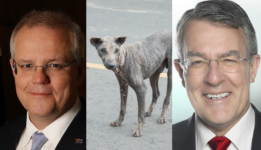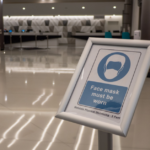NACC Under Investigation for Corrupt Conduct, After Refusing RoboDebt Inquiry

Remember the calls for a federal ICAC now? The campaign was prominent during the later years of the recent decade of Coalition rule, when Scott Morrison was the top minister: a PM so drunk on power that he secretly swore himself into the role of dual minister for five other portfolios.
In those years, Coalition lies, coverups and scandals were spilling out at the seams. And no stranger to controversy, then attorney general Christian Porter released his version of an anticorruption commission in late 2020, which unlike regular models would fry corrupt pollies behind closed doors.
And the collective sigh of relief was audible when Labor came to power in May 2022, as the new PM Anthony Albanese had stated preelection, “I want an anticorruption commission that will hold the political system to account because I believe in our democracy.”
So, new attorney general Mark Dreyfus got to toiling away at a model that ticked all the boxes, including expanding Porter’s closed-door provision, as the Coalition wanted public service cases secreted but not those of law enforcement. But Dreyfus drafted closed door proceedings for all.
And the finished product is the National Anti-Corruption Commission (the NACC), which commenced operating on 1 July last year.
Yet, now it’s clear, that any teeth the watchdog had on final draft have since been knocked out by the chief lawmaker, as this bastion of democracy has decided not to investigate RoboDebt – one, if not the, greatest crime of the Coalition’s time in office – because it’s not in the public interest.
Ministerial racketeering
RoboDebt was a system developed and launched, initially in pilot form, by then federal social services minister Scott Morrison in 2015 and it ran until November 2019. The scheme involved automated debt assessments and recovery in regard to Centrelink, or welfare, payments.
Basically, Morrison launched an illegal scheme that relied on a process of income averaging that produces false results to assess if welfare recipients who also worked casually had received too much money. And a computer made false assessments and sent out demands for false debts.
“The human impacts of Robodebt were being reported,” outlines the RoboDebt Royal Commission report, “families struggling to make ends meet receiving a debt notice at Christmas, young people being driven to despair by demands for payment, and, horribly, an account of a young man’s suicide.”
The commissioner found that it was early 2017, when “RoboDebt’s unfairness, probable illegality and cruelty became apparent”, and despite concerns being raised, the government doubled down on its position, attacking critics in the press and asserting that it was all for the good of the taxpayer.
Yet, the scheme, which saw at least two suicides, continued on for almost three more years. So, when the NACC was finally coming to fruition, campaigners for a federal integrity commission were all expecting that those who devised RoboDebt would finally be served their comeuppance.
Toothless and neutered
When RoboDebt Royal Commissioner Catherine Holmes delivered her report, she included a sealed chapter with the names of six public officials, recommending they face civil or criminal prosecution. And these names were provided to the NACC and the Australian Public Service Commission.
Yet, on 6 June, the NACC released a statement about the request regarding the six unnamed politicians. And it asserts that on scrutinising the referrals and the thorough inquiries into these officials set out in the report, it finds it “unlikely it would obtain significant new evidence”.
The NACC revealed that there are a number of matters it must consider in deciding whether to pursue an inquiry, besides its own obvious lack of confidence in its ability to investigate, and one of them is “whether a corruption investigation would add value in the public interest”.
So, since the Royal Commission investigated RoboDebt and the APSC has been referred five of the six individuals for potential investigation as well, the NACC considers it won’t add anything new if it pursues the case.
So, the Albanese government’s new anticorruption commission explains that beyond it’s considering whether corrupt conduct has occurred, it “cannot grant a remedy or impose a sanction, as the APSC can”, and nor can it make recommendations like the Royal Commission already has.
A NACC investigation “would not provide any individual remedy or redress for the recipients of government payments or their families who suffered due to the RoboDebt scheme”, said the self-hating corruption watchdog and reiterated that it “would not add value in the public interest”.
All gums
But not to worry, Dreyfus ensured that along with the NACC, the position of the Inspector of the National Anti-Corruption Commission was created. And this official is charged with monitoring and detecting corruption within the NACC, investigating such matters and making referrals about them.
Currently, this position is held by Gail Furness, who outlined in a 13 June statement that since the NACC made its decision not to investigate corruption at the highest level of government as that would not be in the public interest, she’s received close to 900 complaints opposing it.
“Many of those complaints allege corrupt conduct or maladministration by the NACC in making that decision,” said Furness, pointing to what must be running through the minds of many constituents who actually believed that federal Labor would dare to go where no Coalition minister would tread.
“I also note that there has also been much public commentary,” the inspector continued. “Accordingly, I have decided to inquire into that decision. I anticipate that I will make my findings public, in due course.”
The NACC advised on the day before it was announced that it’s being investigated in respect to potential “corrupt conduct or maladministration” that since its inception it’s received 3,070 referrals, 450 are currently under preliminary inquiry and it’s conducting 21 corruption inquires.
But so, what? By its own admission, the federal corruption watchdog probably won’t turn up any significant evidence about these matters and the public has no idea what’s going on behind those closed doors anyway.
And to top it all off, the neutered integrity commission is too gutless to go after the most serious and senior offenders because top officials, both red and blue, are obviously telling it to bugger off and get back in its corner.







